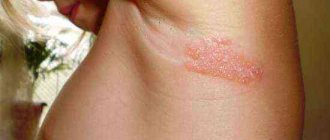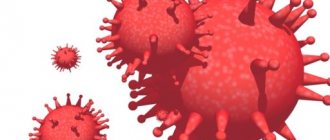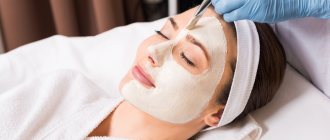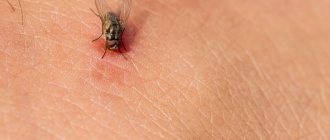Allergies during pregnancy
When a girl prone to allergies prepares to become a mother, or when allergies begin during pregnancy, the happy moments of waiting cease to bring joy. At such moments, expectant mothers face difficult choices. On the one hand, you need to be especially careful when using medications, but, on the other hand, allergic reactions should not be left unattended. Can pregnancy cause allergies? Pregnancy itself cannot cause allergies. However, allergies, as in other situations with increased physical activity, may first appear during pregnancy. How complex biological changes during pregnancy affect the occurrence and course of allergies has not been fully studied scientifically. Types of allergies: Hay fever. Almost one in five women suffer from hay fever during pregnancy. Since the nose of pregnant women is often stuffy due to increased estrogen levels, hay fever gets worse. Asthma. In 20% of women, asthma worsens during pregnancy. Good treatment of asthmatics is especially important, since this allergy can affect the child's lack of oxygen. Eczema. Women who suffer from atopic dermatitis often experience an improvement in symptoms during pregnancy. But for some women, pregnancy only worsens symptoms. Rash (urticaria). Often occurs in pregnant women due to nervousness. Sometimes you need to calm down and put your thoughts in order so that the allergy goes away. Anaphylactic shock. The immune system during pregnancy is prone to anaphylactic shock. Therefore, you should avoid possible allergens and contact a specialist at the first sign of allergy. How does pregnancy affect allergies? To ensure that your pregnancy is not further burdened by allergy symptoms, you need to consult a specialist. An experienced doctor will diagnose the disease and prescribe treatment. Many allergy medications are not recommended for pregnant or nursing mothers. Pregnant women should try to avoid contact with allergy triggers. Then it is possible to reduce medications or completely abandon them. Due to changes in hormone levels in a pregnant woman's body, allergic rhinitis may increase throughout the entire period. Especially at the beginning of the second trimester of pregnancy, many women suffer from nasal congestion. Getting more fresh air, sleeping with your upper body elevated, and saline nasal spray can help in this situation. What are the treatment options for allergies during pregnancy? Despite certain restrictions during pregnancy, methods for diagnosing and treating allergies are available. Skin tests should not be performed at this time, since the risk of anaphylactic shock, although minimal, is present. A blood test is preferred instead. Hay fever during pregnancy can be treated with nasal sprays. Research has so far shown no potential harm to the child from using such products. Immunotherapy or desensitization is a good way to treat the causes of allergies, that is, it is not only a way to remove symptoms, but also to fight the causative agents of allergies. Allergies should be especially carefully monitored and treated during pregnancy. To minimize the burden on the mother and her unborn child. At the first signs of an allergy, pregnant women should definitely consult an allergist. If anaphylactic shock is suspected, an ambulance should be called immediately.
What are the first signs of pregnancy?
A woman may notice symptoms of pregnancy in the first days. A week after conception, the fertilized egg is implanted into the lining of the uterine wall. The process is sometimes accompanied by slight bleeding (or spotting). Scanty pinkish discharge (so-called implantation bleeding) is the first symptom of pregnancy. But most often the woman does not pay attention to them.
Cramps and aching pain in the lower abdomen also warn of pregnancy. They are determined by the tone of the uterus, which will soon become a cozy home for the child.
One of the most reliable signs of pregnancy is an increase in basal temperature. Let us remind you how to measure it. In the morning, while lying in bed, insert the thermometer into the rectum. During ovulation, the temperature usually rises to 37°C and above, and then drops. And when pregnancy occurs, it will remain elevated. Although there are exceptions, this happens with diseases of various kinds.
Women often say that they guessed they were pregnant by changes in their breasts. The bra suddenly became tight, the breasts became very sensitive, the nipple circles darkened, and droplets of liquid began to come out of the nipples.
Many expectant mothers feel drowsiness and increased fatigue from the first days.
It happens that women become sensitive to smells and experience previously unusual cravings for certain foods. Sometimes in the first days after conception, nausea appears in the morning (and not only).
You may experience only one of the above pregnancy symptoms or several. It happens that the early symptoms are minor, and you may not pay attention to them. Most of these feelings will probably stay with you until you give birth. Or maybe you won’t even guess about your situation before the delay, or, on the contrary, you will invent signs of pregnancy for yourself, hoping for a long-awaited event. However, signs of pregnancy at a later date will in any case dispel doubts.
When to see a doctor
Even if the initial stage of the disease and mild symptoms are detected, the woman is advised to consult a doctor to prevent complications.
The treatment of such disorders is carried out by a dermatologist, but consultation with a therapist, gastroenterologist, and also a gynecologist who is managing the pregnancy may be required.
Diagnostics
Urticaria is quite easily diagnosed during pregnancy, since the external manifestations are very pronounced.
To do this, several methods are used that are highly effective:
- A general survey and examination of the patient helps determine the degree of deviation, the form of the disease and the probable causes of its occurrence. The specialist examines the affected area and palpates the skin. After this, he interviews the patient and clarifies the time of appearance of the rash and other symptoms. The procedure is carried out in each clinic free of charge.
- General and biochemical blood tests are considered an important and informative method, carried out in private and public clinics, the cost is approximately 400-600 rubles. Thanks to the diagnostic result, it is possible to see concomitant deviations from the internal organs. Blood is taken from a vein and sent to the laboratory for testing.
- Dermatoscopy is an instrumental diagnostic method in which the skin in the area of the rash is examined using a special dermatoscope device. This method is used to clarify the diagnosis and is considered the most informative and effective. Its cost in different clinics is 400-800 rubles.
- Blood testing to identify an allergen is also one of the most effective research methods. Blood is taken from the patient's vein and then examined in the laboratory. The result helps to identify a specific allergen and exclude it. The cost of diagnostics in clinics is approximately 800-1200 rubles.
Dermatoscopy is considered the most effective method, but in combination with other methods, diagnosis is carried out comprehensively and brings a more accurate result.
Reasons for appearance
Urticaria during pregnancy develops as a result of many provoking factors. Aquagenic is a consequence of exposure to water, solar is a consequence of the sun's rays, and cold is a consequence of the action of low temperatures. The food allergy is considered to be a consequence of consuming various foods in large quantities, while the toxic form occurs when the body is exposed to poisons.
Drug-induced urticaria most often occurs when taking medications that contain aggressive components. The psychogenic and neurogenic form of the disease occurs as a result of severe emotional shock, and the somatic form occurs as a result of any disorders of the internal organs.
There are common reasons that can lead to the development of any type of pathology:
- Smoking for many years even while carrying a child.
- Drinking alcohol on a regular basis and in large quantities.
- Panic attacks associated with the upcoming birth and other problems.
- Professional activities associated with constant physical activity, as well as contact with harmful substances, toxins and poisons.
- Predisposition to similar conditions.
- Weakening of the body's immune defense.
- Excessive increase in estrogen levels in the blood.
- Toxicosis in the early and late stages of pregnancy.
- Insect bites.
- Use of cosmetics containing aggressive components.
- Taking vitamin complexes without a doctor's prescription.
- Skin contact with synthetic materials.
It is worth noting that such reasons can provoke urticaria in any trimester of pregnancy , since the woman’s body at this time is weakened and is not able to fully resist various allergens. Women in the 1st, 2nd and 3rd trimester are equally susceptible to the disease.
Possible complications
Urticaria does not pose a danger to the fetus, which is reliably protected by the placental barrier. However, negative symptoms in the mother can lead to complications in the fetus.
The most common consequences of pathology:
- Fetal malformations as a result of independent uncontrolled use of medications.
- Transition of pathology into a chronic form.
- Anaphylactic shock.
- Quincke's edema, threatening the patient's health.
The most dangerous complication is considered to be death, which develops as a result of Quincke's edema and respiratory failure, causing suffocation.
Urticaria is considered a rather serious disease that can occur in a woman during pregnancy and disrupt its course. When the first signs of the disease appear, you must immediately visit a doctor to prescribe adequate treatment. It is strictly contraindicated to take any medications or homemade preparations on your own.
Treatment of urticaria during pregnancy
Treatment of urticaria in expectant mothers is complicated by the ban on the use of many medications. Diagnosis also requires special attention, since the manifestations of urticaria are similar to other diseases, for example, dermatitis of pregnant women.
In order to prescribe the correct treatment, the dermatologist, in order to determine the exact cause, refers the pregnant woman for examination. First of all, you should take various blood tests (general, biochemical, for the presence of sexually transmitted diseases), urine, mucosal smears, hormone tests, and feces to identify parasites.
Once the diagnosis is made, treatment is prescribed. Potent drugs are used only when there is a significant threat to the mother's life. Among preventive measures, first of all, the doctor recommends a balanced diet. You should also give up cosmetics, bad habits, and avoid contact with any chemicals.
Symptoms
Symptoms of the pathological condition will differ depending on the type of disease and the degree of its neglect. As a rule, the first manifestations occur some time after a woman comes into contact with an allergen or experiences severe stress. The patient experiences itching, which is localized in the abdomen and gradually spreads to the lower extremities.
There is no rash at this stage, but the patient becomes irritable and sleep is disturbed. Constant itching leads to a sharp change in mood, as well as the development of depression. As the disease progresses, raised red spots of varying sizes appear at the site of scratching. They can be small, but some reach 15 cm in diameter.
Spots are the most pronounced external manifestation of the disease. Gradually they spread to the upper and lower extremities, back and sides. In severe cases of the disease, the rash affects the skin of the face, and the itching in this area becomes unbearable.
The patient becomes weak, irritable, quickly gets tired, and also refuses to eat. Constant scratching of the affected area leads to the appearance of a persistent and quite severe burning sensation of the skin and areas of peeling.
However, it is worth remembering that red spots rarely merge into one lesion . Despite this, scratching leads to damage to some lesions and the formation of a weeping surface. Its presence increases the risk of infection.
An additional manifestation of urticaria is rhinitis, which also has an allergic origin. A large amount of colorless transparent liquid is released from the patient's nose, the skin becomes swollen and reddened. Allergic conjunctivitis, characterized by swelling of the eyelids and itching, as well as souring of the eyes, is possible.
The skin on the body in the area where the lesions spread can also be swollen, especially in the face. As a rule, such manifestations are considered a sign of other diseases. In any trimester of pregnancy, the symptoms of urticaria are almost the same, which makes diagnosis easier.








